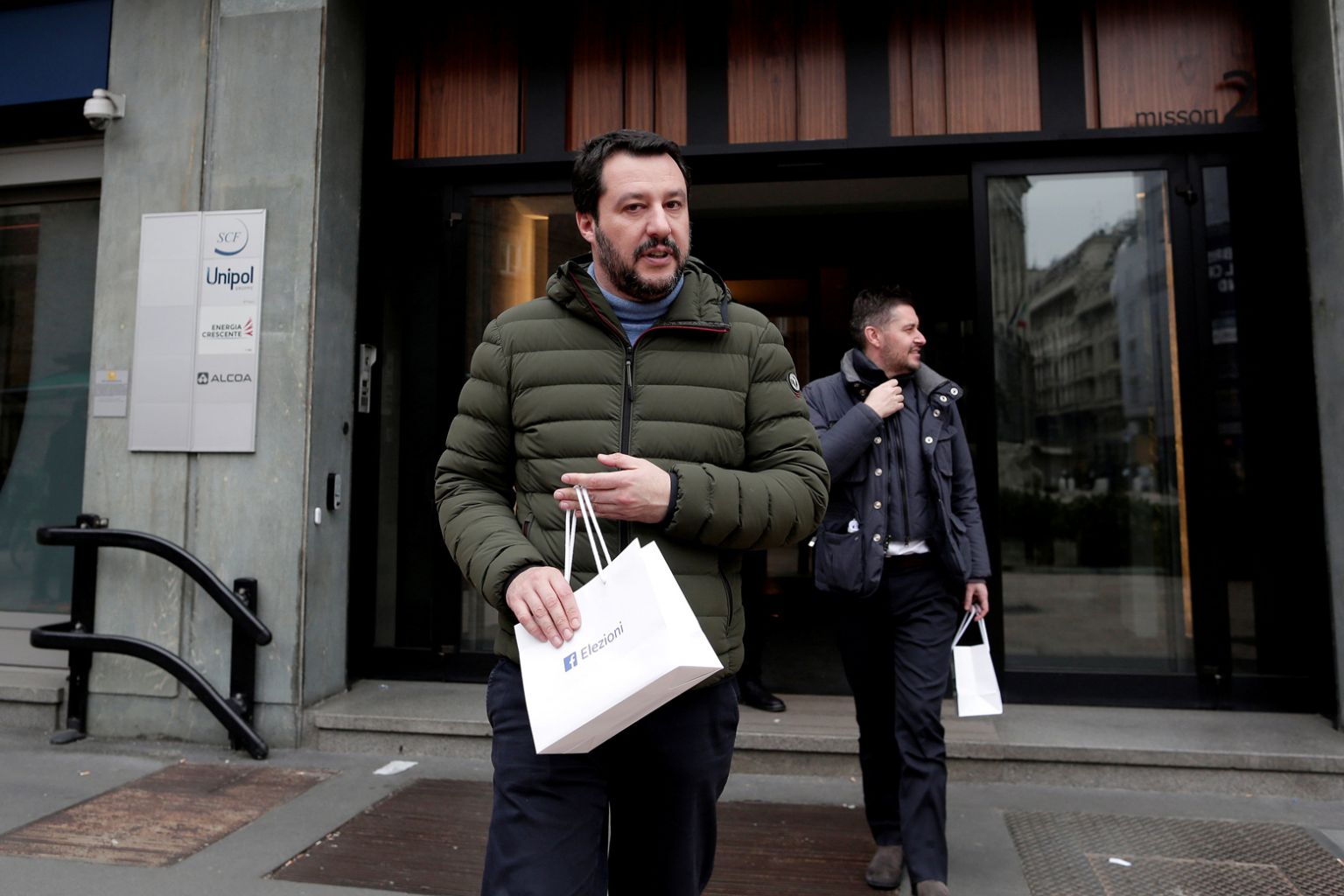Now bots are trying to help populists win Italy's election
Sign up now: Get ST's newsletters delivered to your inbox

In just over a minute, more than 150 Twitter users sent out the same tweet extolling Italian anti-euro populist Matteo Salvini (above), a contender in next month's presidential election.
PHOTO: REUTERS
Follow topic:
ROME (BLOOMBERG) - Shortly after midnight on Jan 24, the home-made device computer programmer David Puente built to catch fake Twitter accounts in the act started rumbling.
In just over a minute, more than 150 users sent out the same tweet extolling Italian anti-euro populist Matteo Salvini, a contender in next month's presidential election. It was obvious to Puente, that they were bots, or automated accounts that masquerade as real people and are used increasingly as a tool to sway political opinion.
"Monitoring the accounts of all the candidates is a civic duty for me," said Puente, 35, who often stays up until 3am tracking social-media activity from his home in northern Italy while his family sleeps.
Fake accounts on Twitter and Facebook that have lain dormant since a 2016 referendum campaign are springing back to life before the Italian ballot on March 4. Polls indicate no clear winner, leaving plenty of room for different factions to exploit social media to try to swing more votes their way.
Findings of the digital forensic research lab at Atlantic Council in Washington suggest the campaign could be vulnerable to manipulation using these robot accounts.
Such concerns were validated just last week when United States special prosecutor Robert Mueller detailed a sweeping conspiracy orchestrated by Russia to interfere in the 2016 US presidential election, with social media a key to the effort. Bots - which follow, tweet, re-tweet and like content - can exaggerate the support for smaller factions and spread false or inadequate information.
The use of bots isn't illegal, but they can have a real effect on voter intentions, according to Maks Czuperski, a director of at Atlantic Council lab who is part of a team travelling to Italy next week to monitor internet activity in the run-up to the vote. "We are detecting an attempt to popularise the more extreme parties, both right and left," he said.
The council is keeping an eye on election-related activity on social media with the help of volunteers like Puente, who developed a program in his spare time that allows him to identify how a tweet is generated.
By analysing the underlying code of the suspicious tweets sent in January, he traced them to the website of Salvini's Northern League and linked to the party's official Twitter feed, @LegaSalvini. Puente quickly posted his findings on his blog and then to his more than 7,000 followers on Twitter. He tagged Salvini in the tweet, which lamented the use of automated accounts to spew propaganda. It was re-tweeted almost 350 times.
Salvini's press office did not respond to a request for comment.
Salvini is a longshot to become Italy's next prime minister, but his coalition with ex-premier Silvio Berlusconi, head of the centrist Forza Italia party, gives his party more of a chance.
While Berlusconi has shot down his ally's views on the euro, the anti-establishment Five Star Movement also questions the benefit of European Union membership. That is one reason some analysts suspect Russia may try to meddle in the vote to expose fissures in the EU.
A report by the US Senate last month highlighted Italy as a potential target for the Kremlin, and the Atlantic Council found evidence tying Russian hackers to fake online activity leading up to Germany's general election and Catalonia's struggle for independence from Spain last year.
"Italian elections are crucial for Russia," said Michael Carpenter, former US deputy assistant secretary for defence, now senior director of the Penn Biden Centre for Diplomacy. "If Russia can help achieve its desired electoral outcome it will try."
Fyodor Lukyanov, head of the Council on Foreign and Defence Policy, a research group that advises the Kremlin, slammed the allegations. "Everywhere there's an election, we're accused of intervening. In this case, there's no point at all because in Italy, traditionally all political forces are positively-minded toward Russia."
The use of bots, which by one estimate account for 15 per cent of Twitter's approximately 330 million users, to further political agendas has been on the radar since the election of Donald Trump. Automated tweets accounted for 19 per cent of election tweets leading up to his 2016 victory, according to findings of the University of Southern California.
Italians are worried about being duped. A poll published by La Stampa newspaper on Feb 5 found about 80 per cent of respondents believe that falsified reports have the power to swing the vote. About half said they'd been fooled by fake news over the last 12 months.
Facebook has taken out ads in Italian newspapers asking users to flag suspicious activity. Italian police are on alert, too, encouraging users to report suspicious posts - and there's even an portal where users can submit dubious material for police checks. "It is not all about changing voters' minds," said Carpenter, of the Penn Biden Centre. "It is also about fomenting animosities and fuelling political divisions."

